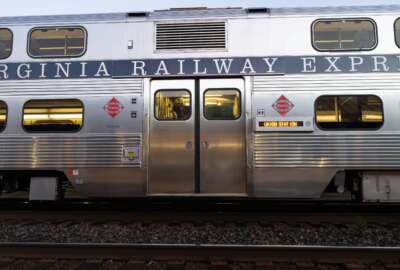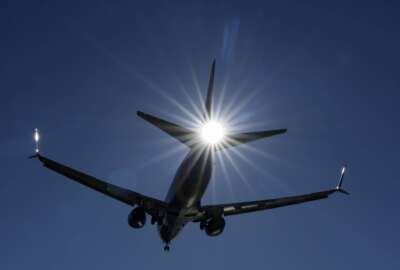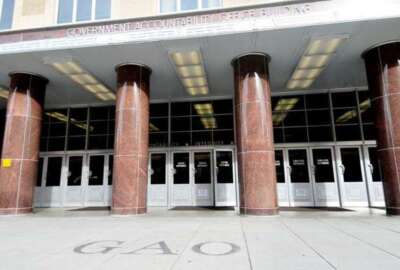
Insight by Virginia Railway Express
Reduced telework creates opportunity for federal workers to rethink commuting options
With routes parallel to I-66 and I-95, Virginia Railway Express offers speedy alternative to sitting in traffic, CEO Rich Dalton says. Plus, when the monthly...
As federal agencies continue to increase the number of days workers must be in the office, many employees are looking for a better way to commute. That’s why thousands turn to the Virginia Railway Express (VRE) each weekday.
“There’s little more frustrating and stressful than sitting in traffic. As more people return to the office after the holidays, highway congestion will only worsen,” VRE CEO Rich Dalton said. “By leaving the driving to VRE, commuters have time to kick back and relax.”
About 140,000 federal civilian workers live in Virginia, which ranks third behind California and Washington, D.C., according to the Congressional Research Service. Seventy percent of VRE’s riders are federal workers who appreciate the safe, reliable, convenient and comfortable service the rail system provides.
And VRE is affordable, Dalton said. “Federal workers can receive transit benefits that cover most or all of the cost to commute on our trains. Our fares are based on distance travelled, which means commuters to the far south may have a small out-of-pocket expense.”
For example, when the monthly federal commuter transit subsidy increases to $315 on Jan. 1, long-distance riders may pay about $28 monthly. Most monthly federal passengers will ride for free.
Even without the transit subsidy, VRE is a cost-effective commuting option. The Bureau of Transportation Statistics notes that drivers spend 72 cents per mile to commute and that doesn’t include parking. VRE passengers pay between 14 and 22 cents per mile, depending on the type of ticket purchased, and parking is free at most VRE stations.
32 trips daily along Virginia’s main travel corridors
VRE has 19 stations, spread across two lines, and one under development. The rail lines parallel two of the region’s most highly congested corridors. The Fredericksburg Line runs adjacent to I-95 and the Manassas Line closely follows I-66.
“We operate a total of 16 trains each morning and another 16 in the afternoon and evening,” said Dalton. “Our first train leaves the Spotsylvania station at 4:52 a.m. and the last train departs Union Station at 7 p.m.”
Should an emergency arise and a VRE passenger needs to get home when trains aren’t running, they are guaranteed a ride home through a program run by the Metropolitan Washington Council of Governments. Commuters who use public transportation at least twice a week can be reimbursed for rides home up to six times per year for unexpected emergencies like personal illness or unscheduled overtime. The program is free, but registration is required.
Knowing there’s a guaranteed ride home allows VRE passengers to commute with peace of mind, Dalton noted.
There’s also a level of personal comfort that comes from riding VRE, he said. “You can bring your breakfast onboard and enjoy the train’s amenities, like comfortable seats with ample legroom as well as restrooms. Our passengers often read, check emails, listen to a podcast or catch a quick nap.”
Dalton added that when he takes the train, he will often turn on his phone’s hotspot to get a jump start on work; other days he just enjoys the ride.
“Some of the views from our trains are sensational, and it’s not unusual for riders to post photos to social media of the sun rising or setting over the Potomac River,” he said.
VRE is also one of the most environmentally friendly ways to commute. The Federal Transit Authority has noted taking the train instead of a car reduces a traveler’s carbon emissions by about two-thirds. For those who want to ditch the car completely, VRE offers bicycle parking at all stations and allows full-size and collapsible bikes on all trains.
“VRE offers a commute like no other,” Dalton said. “One ride is usually all it takes to convince folks to switch to VRE.”
Learn more now about Virginia Railway Express service.
Copyright © 2025 Federal News Network. All rights reserved. This website is not intended for users located within the European Economic Area.
Related Stories
A federal return-to-office won’t solve the government’s office space problems
Featured speaker
-

Rich Dalton
Chief Executive Officer, Virginia Railway Express
Upcoming Events
Related Stories
Top Stories

Rich Dalton
Chief Executive Officer, Virginia Railway Express
A seasoned veteran of rail operations, Rich Dalton is the Chief Executive Officer of the Virginia Railway Express (VRE). Dalton, who joined VRE in 2009 as director of rail equipment and services, previously served as chief operating officer and deputy CEO, and acting CEO.
Prior to joining VRE, Mr. Dalton spent 20 years in the private sector, focusing on customer service, operations, and technical solutions for the rail industry. He was forward deployed in various sea commands in the United States Navy. He holds a bachelor’s and master’s in business administration from Sam Houston State University in Huntsville, Texas.
Mr. Dalton was instrumental in VRE’s implementation of positive train control in 2019, making it one of the first commuter rail services in the U.S. to do so. Chief among his accomplishments are the standardization of VRE’s fleet through the procurement of new locomotives and passenger rail cars, implementation of both lifecycle maintenance and reliability-centered maintenance, and cultivation of positive working relationships with VRE’s host railroads. Mr. Dalton also played a key role in extending VRE service to Spotsylvania County in 2015.




